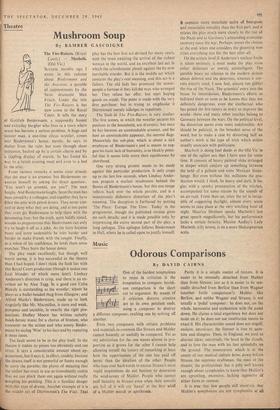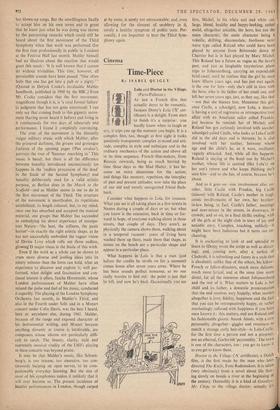Music
Odorous Comparisons
By DAVID CAIRNS ONE of the hardest temptations to resist in criticism is the Even two composers with certain problems and materials in common like Strauss and Mahler cannot honestly or usefully be compared. Yet as my admiration for the one wanes almost in pro- portion as it grows for the other 1 cannot help . allowing myself the luxury of remarking at least how the opportunism of the one has paid off better than the idealism of the other. People who lean over backwards to excuse Strauss's most vapid inspirations do not hesitate to determine the weaknesses of Mahler. People who cannot sniff banality in Strauss even when their nostrils are full of it will cry 'banal' at the first whiff of a Mahler march or apotheosis. Partly it is a simple matter of texture. It is easier to be sensually detached from Mahler than from Strauss, just as it is easier to be sen- sually detached from Berlioz than from Wagner (another futile comparison!). Mahler, like Berlioz, and unlike Wagner and Strauss, is not usually a `pedal' composer : he does not, on the whole, harmonise and orchestrate with the pedal down. He claims a total experience but does not insist on it; he does not use totalitarian means to exact it. His characteristic sound does not engulf, enslave, intoxicate: the listener is free to ques- tion and disagree. Then, in England, we tend to distrust ideas, universals, the head in the clouds, and to love the man with his feet splendidly on the ground. The amateurism which is at the centre of our musical culture bows down before Strauss the supreme craftsman, the man of the theatre, the professional; but it jolly well knows enough about symphonies to know that Mahler's are sprawling, excessive, lacking ingenuity of either form or content.
It is true that few people still maintain that Mahler's symphonies are not symphonies at all but blown-up songs. But the unwillingness finally to accept him on his own terms and to grant that he knew just what he was doing was shown by the patronising remarks which could still be heard about the first movement of the Third Symphony when that work was performed (for the first time professionally in public in London) at the Festival Hall last month. Mahler himself had no illusions about the reaction that would greet this music : 'It is well known that I cannot do without trivialities. This time, however, all permissible sounds have been passed. "One often feels that one has got into a pub or a pigsty." ' (Quoted in Deryck Cooke's invaluable Mahler handbook, published in 1960 by the BBC.) Even Mr. Cooke considers that the first movement, magnificent though it is, is 'a total formal failure' (a judgment that has not gone unnoticed). I can only say that coming fresh to this gigantic move- ment (having never heard it before) and living in it continuously for two days of rehearsals and performance, I found it completely convincing.
The crux of the movement is the blatantly vulgar military music with which Mahler, after the primeval darkness, the groans and grotesque fanfares of the opening pages (Tan awakes'), portrays the rout of 'Summer marching in.' This music is banal; but there is all the difference between banality introduced unconsciously (as happens in the 'endless procession of the dead' in the finale of the Second Symphony) and banality deliberately used for a valid artistic purpose, as Berlioz does in the March to the Scaffold—and as Mahler seems to me to do in the first movement of the Third. The structure of the movement is unorthodox, its repetitions uninhibited, its length colossal; but, to my mind, once one has absorbed and accepted the musical material, one grasps that Mahler has succeeded in embodying his direct experience of omnipo- tent Nature—`the heat, the stillness, the panic horror'—in exactly the right artistic shape, as he has not successfully embodied the vaguer vision of Divine Love which rolls out those endless, glowing D major vistas in the finale of this work.
Even if the work as a whole can be shown to cram more diverse and jostling ideas into its ninety minutes than the form can hold, what an experience to discover and explore it; well per- formed, what delight and fascination and con- tinual interest it offers. Jascha Horenstein, whose London performances of Mahler have often missed the pulse and feel of his music, conducted it superbly. The playing of the London Symphony Orchestra last month, in Mahler's Third, and also in the' Fourth under Solti and in a Mozart concert under Colin Davis, was the best [ heard, here or anywhere else, during 1961. Mahler, because of the range and exposed character of his instrumental writing, and Mozart because anything slovenly or coarse is intolerable, are composers whose idioms are particularly diffi- cult to catch. The beauty, clarity, style and supremely musical vitality of the LSO's playing in these concerts was beyond praise.
It may be that Mahler's music, like Schoen- berg's, is too intense, too obsessive, too con- tinuously harping on open nerves, to be com- panionable everyday listening. But the size of most of his symphonies makes it unlikely that it will ever become so. The present incidence of Mahler performances in London, though carped at by some, is surely not unreasonable; and, even allowing for the element of snobbery in it, surely a healthy symptom of public taste. Per- sonally, I am impatient to hear the Third Sym- phony again.



























 Previous page
Previous page